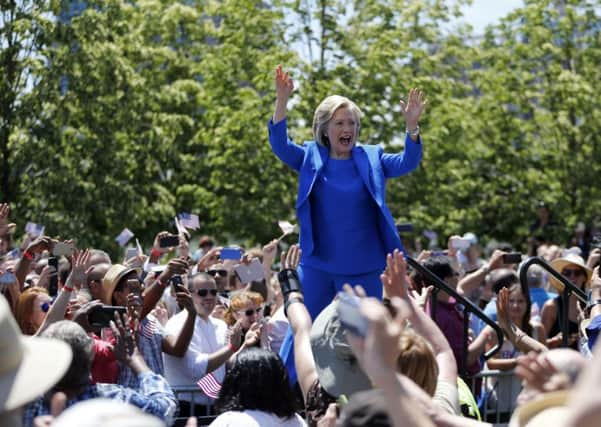Mark Casci: Can Donald Trump be out-trumped in race to the White House?


The result will garner huge international media attention but the vote in Iowa, a relatively small and rural state, will – in reality – be largely meaningless in the grand scheme of things. Just one per cent of each party’s delegates – the support needed to secure each party’s’ individual nominations – is up for grabs.
Barring a massive upset today’s vote will be won by the current frontrunners Hillary Clinton and Donald Trump.
Advertisement
Hide AdAdvertisement
Hide AdFor Clinton this is her last chance at becoming the first female president in the nation’s history. However, as the former First Lady and Secretary of State remembers only too well, she has been here before. In 2008 she was seen as the presumptive nominee for Democrats with her candidacy a mere formality when she announced she would run. However a lacklustre campaign saw her quickly eclipsed by the then rising star Obama. Her nearest competitor this time is Bernie Sanders, a long-standing senator from Vermont. With his shock of white hair, the 74-year-old hardly resembles the youthful and media-friendly Obama of 2008. However he is proving increasingly adept at energising the ever elusive youth vote.
Much like the candidacy of Jeremy Corbyn in last year’s Labour leadership contest, he has gone from being viewed as a left-wing spoiler candidate to an increasingly realistic prospect.
Utilising social media, he has run an entirely positive campaign, presenting a feel-good vision of social justice, egalitarianism and environmentalism.
One month ago Clinton was polling 22 points ahead of Sanders in Iowa, that margin has been cut to five percentage points. When it comes to the next, more substantive, primary in New Hampshire, Sanders is ahead by six points. For Clinton the picture must be eerily familiar.
Advertisement
Hide AdAdvertisement
Hide AdThings are very different for the Republican frontrunner – Trump has consistently increased his lead over his rivals. So confident of victory is he that he did not even participate in the official televised debate with his fellow Republican candidates. He doesn’t need to, his media profile is colossal, thanks in the main to his propensity to make controversial remarks.
So far Muslims have been told they will not be allowed to enter the country until, in Trump’s own words, “we can find out what the hell is going on”, presumably hoping that the extraordinarily complex issue of religious extremism and radicalisation will be solved within his first term in office.
Mexicans, he has claimed, are bringing drugs and rapists into the country.
They are diametrically opposed politically but he and Sanders reach parts of the electorate that most politicians can only dream about. Both share outsider status, having little to do with the “Washington bubble”.
Advertisement
Hide AdAdvertisement
Hide AdBoth too, in their own contrasting ways, offer voters hope, salvaging what little remains of the American Dream. Sanders promises a government for the people, by the people, while Trump offers an America that recovers its sense of pride and is no longer scared to speak its mind.
So are we set for a Trump/Sanders showdown in November? Unlikely.
Sanders would be 75 on election day, a full six years older than Ronald Reagan when he was sworn in for his second term, making him by far the oldest president to be elected. His views on wealth distribution will make him the antichrist to the majority of moderates who still view socialism as a menacing evil.
And what of Trump? Were he to win, he would make history in becoming the first president to have never held an elected office, or a military background, prior to taking the White House.
Advertisement
Hide AdAdvertisement
Hide AdFor any presidential candidate to have a hope of winning, he or she needs to have backing from virtually all ethnic minorities. Trump’s Mexican comments alienated the fastest growing demographic in American politics, with the Latino electorate counting for nearly one in five votes. His Muslim travel ban is so unworkable as to be risible while his macho and boorish image too will be a turn-off to many women voters.
The polls also show Trump ahead now but what they do not show is that as many as one in four registered Republican and one in three independents have yet to make their mind up as to who they would like to see secure the nomination. It’s unlikely Trump is going to win any more converts.
He can only go backwards from now, with Marco Rubio – in my view the likely nominee – set to pitch to the GOP faithful that only they can beat Clinton.
However the question remains why is America so keen on such fringe candidates? The growing malaise in faith and trust in mainstream politics means increasingly that voters are willing to back a candidate who shares their values and outlook, even if they have not a prayer of winning office.
Advertisement
Hide AdAdvertisement
Hide AdThe magic formula in politics is to combine idealism with electability. It’s a formula that very few in modern political history understand, with the notable exception of the current occupant of the White House.